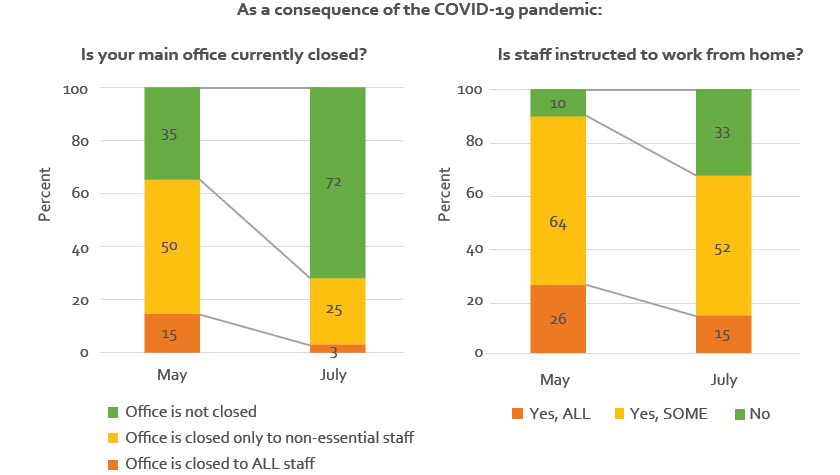The novel coronavirus pandemic continues to ravage countries across the world taking a heavy toll, with more than 25 million cases and over 750,000 deaths globally as of this writing. Most countries are still under some restrictions to limit the spread of the virus and continue to operate in emergency mode.
National statistical systems also continue to face tremendous challenges as a result of the crisis at a time when data are more urgently needed than ever to inform critical interventions to save lives, restart the economy and address the long-term impact of the pandemic.
The Statistics Division of the United Nations Department of Economic and Social Affairs and the World Bank's Development Data Group, in coordination with the five UN regional commissions, just released the results of the second round of a global online survey to monitor the impact of the coronavirus crisis on National Statistical Offices (NSOs). The survey provides key information to help identify areas that require priority support from partners and develop plans for longer term interventions.
While the first round of the survey provided a snapshot of the situation in May 2020, the second round looks at how restrictions and disruptions have receded or become more widespread over time and at how national and international stakeholders are coordinating their response to the data challenges posed by the pandemic.
The responses collected from the chief statisticians of over 100 countries help understand concrete support needs and how they may best be addressed to help countries navigate this unprecedented crisis. They also highlight stark differences across regions and income levels, as statistical agencies in low- and middle-income countries face the highest level of disruption to their operations and have the greatest needs in terms of technical assistance and financial resources.
While statistical agencies play a vital role in producing timely and reliable data to help governments respond effectively to the socio-economic and health impacts of the pandemic, NSOs in low- and lower-middle income countries draw attention to insufficient coordination of national statistical systems in the response to the pandemic, lack of appropriate infrastructures to allow for a prompt and effective conversion to remote operations and urgent need for additional support to face these challenges.
Here are some key findings:
- While many offices have reopened and are gradually returning to face-to-face data collection, the majority still operate in emergency mode with some or all staff working from home. Even though remote work has become the new norm for many, up to 20% of offices face constraints in their ability to work from home due to inadequate ICT equipment or infrastructure. This underscores the need for more decisive investments in digital technology, to support remote work, training, data collection, and data storage, which are vital for NSOs to operate during the pandemic.

- Short-term statistical production, which heavily relies on traditional face-to-face methods, continues to be affected, with low- and middle-income countries impacted the most. Three out of four countries in that income group saw their production of monthly and quarterly statistics negatively affected by the pandemic. In contrast, two thirds of the responding countries in the high-income group reported that their production of short-term statistics had been completely unaffected, which may partly be attributed to their heavier reliance on alternative administrative data sources and remote data collection modes. This underlines the need for smart investments to build the necessary infrastructure and the right spectrum of skillsets across national statistical systems data producers in low- and middle-income countries.
- Coordination of national statistical systems needs strengthening in many countries to effectively respond to the COVID-19 pandemic-related data needs. Coordination seemed to be most challenging in Oceania and Sub-Saharan Africa, where only around one third of the reporting countries showed satisfaction with the current level of coordination. A well-coordinated national statistical system is crucial for efficient data collection and dissemination to meet the needs of policymakers. A stronger coordination and stewardship role of National Statistical Offices may be needed to address these coordination problems and enhance effectiveness of individual efforts.
- More assistance is needed to help NSOs mitigate the challenges of the COVID-19 pandemic, particularly in low- and lower-middle income countries. Most countries in this group voiced a strong need for every type of support, including equipment and infrastructure. Two thirds or more of upper middle-income countries also reported requiring technical assistance, training and financial support. To counter the global data inequalities exacerbated by the COVID-19 pandemic, the global statistical community and donors must urgently provide technical assistance and digital infrastructure support to the national statistical offices most in need.
NSOs have voiced their concerns and identified clear needs. Of particular relevance to combat the growing inequities in statistical production is a call for strengthening the technical capacity and digital infrastructure that are critical for NSOs, in their coordinating role in the national statistical system, to continue operating effectively and take advantage of the fast-evolving data collection methods and technologies. The time is now for development partners to launch a strong, coordinated effort of targeted investments for the development of new data skills and upgrading of digital infrastructures for countries in greatest need and weakest in human capabilities and physical infrastructure to be able to modernize and innovate.
Resources:
Read the full survey report: Monitoring the State of Statistical Operations under the COVID-19 Pandemic
Read the blog post by Haishan Fu, Director of the Development Economics Data Group and Stefan Schweinfest, Director of the UN Statistics Division, on how COVID-19 is widening the gulf of global data inequality




Join the Conversation